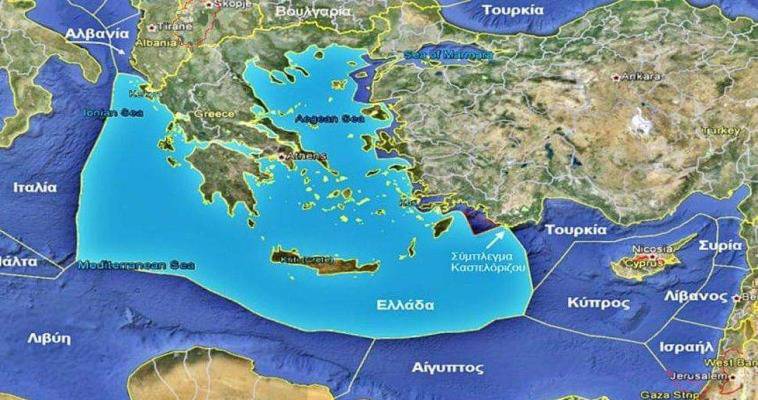Stavros Lygeros: Greek-Turkish negotiations with open agenda – Demarcation and “incidental issues”
03/08/2020
The freeze on research by the Oruc Reis vessel was the result of German mediation, which ensured, in return, for Erdogan that Athens would sit for negotiations, without canceling the Ankara-Tripoli memorandum. Indirectly but clearly, this is legitimized only by the Greek-Turkish negotiation, which for communication reasons is called by the most easily digestible term “dialogue”.
I estimate, in fact, that he would have sat at the table on worse terms, if the Greek armed forces had not mobilized. If the message had not been sent that the research would lead to conflict, Erdogan would most likely have created a fait accompli with the “Oruc Reis” and as a result the Greek-Turkish negotiations would have emerged. If this had happened, the Turkish side, among others, would have been sitting at the table with the air of the winner.
Erdogan, however, did not want to risk a conflict when he began to think that Athens might not be bluffing. The Turkish president was also “pushed” to freeze research by two more events related to the mobilization of the Greek armed forces: the negative climate for Ankara in the West and the potentially anti-Turkish “alliances” in the Eastern Mediterranean.
Especially the direct involvement of France in Libya (bombing of the Turkish base Al Watiya) forced Erdogan to retake stock of a move that would probably lead to a Greek-Turkish conflict. This is because it was possible to involve other states, with the result that Turkey was faced with a very dangerous situation. These were the reasons why Erdogan responded to the German mediation, which is also supported by Washington. It justifies, after all, the freezing of research (by one month) with the acceptance by Athens of the negotiation, which is what was traditionally sought by the Turkish side.
The Greek-Turkish negotiation is “open”
Ankara claims that the negotiation will be “open”, in the sense that each side will be able to raise any issue it wants. In other words, it seeks to negotiate the whole gamut of its unilateral expansionist claims. Its goal in the first phase is – through negotiation – to legitimize them as bilateral disputes. This will happen if Athens agrees to discuss them, even, if just to reject them.
The Greek side is cautious and – at least in words – insists on the firm position that the only difference is the delimitation of the continental shelf-EEZ. The main obstacle is that the positions of the two sides are diametrically opposed. Ankara claims – in violation of the Law of the Sea – that the islands do not have a continental shelf, while Athens claims that they have full influence on a continental shelf-EEZ.
If Athens had been consistent in its position on a “single dispute”, instead of negotiating, it would have insisted that the dispute over the influence of the islands on a continental shelf-EEZ should be referred to the International Court of Justice with a co-binding agreement, which does not contain suggestions to the court. But things are not so simple. The demarcation is connected with two critical issues: First, with the expansion of Greek territorial waters. Secondly, with the theory of “gray zones”.
“Cohesive exploitation”
Both arose during informal exploratory contacts (34 rounds), which in 2003 (headed by Ambassadors Anastasios Skopelitis and Ugur Zial) were supposed to bring the two countries one step closer to The Hague. It should be noted that in those negotiations Ankara negotiated the recognition of a continental shelf (not full influence) on Greek islands in the eastern Aegean, if Athens ceded 23% of the Aegean continental shelf (they did not discuss the Eastern Mediterranean at the time).
The Turks demanded that they be given a single and not a scattered continental shelf in the northern Aegean, in the area defined (outside Greek territorial waters) by Mount Athos and Sithonia, Skyros, the islet of Kalogeroi (west of Chios), Agios Efstratios Lesvos. They called for the principle of “cohesive exploitation” to be applied there, arguing that there are extensive international waters in the northern Aegean, but bearing in mind that any oil deposits likely to exist in the Aegean exist there. Alternatively they had proposed either sharing between the two countries, or co-exploitation with predetermined percentages.
Ankara had asked the co-sponsor to effectively delimit the continental shelf in the Aegean and simply the International Court of Justice to issue a decision almost predetermined by the co-binding agreement. With the seal of The Hague, the agreement would be easier for Greek public opinion to swallow. Turkey sought to acquire a continental shelf west of the Greek islands in the eastern Aegean not only for economic but also for geopolitical reasons, as it would thus trap them, signing what amounted to a mortgage for future claims.
Round 27 and “incidental issues”
According to a report I had published in “Kathimerini” in 2006 (4-6-2006) and which was never disputed, the Greek side had largely accepted the aforementioned Turkish proposals, in order to refer the “difference” to The Hague. In the spring of 2003, however, in the 27th round the “gray zones” obstacle arose.
It should be noted that until the exploratory contacts, Greece did not ask for the delimitation of the Aegean continental shelf in general, but specifically for the sea extension of the border line in Evros and the sea area between the Greek islands of the eastern Aegean and the coasts of Asia Minor. Compared to this firm position, the co-binding agreement plan was a major Greek retreat.
The most dangerous thing, however, was that it explicitly stated that the two sides agreed that the “incidental issues” would be resolved by the International Court of Justice, as well. When Skopelitis asked for the “incidental issues” to be determined, Zigal had avoided naming them, saying Ankara would have the right to raise any issue it wanted. In fact, it had made it clear that it would maintain its positions intact, even if the Court ruled that the issues raised by the Turkish side would not be “incidental” and refuse to judge them.
If the Court asked both sides for maps of the territories on both sides, the problem would arise. For a number of Greek islands, Ankara would claim (it has been claiming since 1996) that they are “gray zones”, although now it is talking about “Turkish islands under Greek occupation”! It should be noted that Jial had appeared flexible in this matter, which had been discussed several times. He hinted, but did not commit, that if Ankara got what it wanted on the continental shelf, it would not play the “gray zone” card loudly at that stage.
Multi distance territorial waters
As I mentioned before, the second issue related to the demarcation is the extension of Greek territorial waters to 12 miles. Skopelitis had raised it early, but his interlocutor had refused to discuss it, citing the Turkish National Assembly’s decision that the expansion was a cause for war. Nevertheless, the Greek side had put on the table various proposals, the common denominator of which was the range of territorial waters in the Aegean to vary from six to 12 miles.
In a few areas, mainly in the northwestern Aegean, where the extension does not affect Turkish claims, it would extend to 12 miles. In the southern and eastern Aegean, however, where the expansion affects both the continental shelf and the extent of international airspace used by Turkish fighters, Greek territorial waters would remain at six miles, with no possibility of future expansion. According to reliable information, that formula was negotiated later, but the Turkish side did not follow up.
The material gathered from those negotiations will be – according to reliable information – the starting point of the new Greek-Turkish negotiation. The same problems will again be put on the table, although now the emphasis on demarcation will be on the Eastern Mediterranean, not the Aegean. The Turkish pursuit, however, is the same: sharing – in one way or another – the sovereign rights granted by international law to Greece. The Ankara-Tripoli memorandum, in fact, gives Erdogan a key negotiating advantage.





